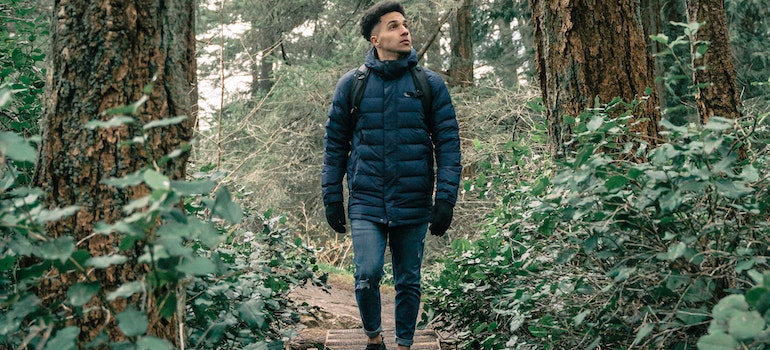Nature-based therapies have gained recognition for promoting well-being, reducing stress, and improving mental health. Each of these approaches offers a unique perspective on the profound relationship between humans and the natural environment, emphasizing the potential for healing, restoration, and personal growth. Harmony Ridge Recovery Center WV will compare these nature-based therapies in West Virginia and explore this fascinating branch of holistic wellness practices that harness the healing powers of the natural world. We will examine the nuances and effectiveness of these therapeutic approaches and several distinct methods that connect people with the serene embrace of nature.
Drug Overdose Problem in West Virginia
In 2021, West Virginia witnessed 1,253 opioid overdose deaths. This figure constituted a staggering 83% of all drug overdose fatalities within the state. These alarming statistics underscore the urgent need for innovative and holistic approaches to substance abuse treatment in WV. Nature-based therapies offer a solution to this crisis, providing a unique and powerful means to address addiction and its underlying factors. Harnessing the natural landscapes of the state, these nature-based therapies in West Virginia can drive meaningful change in the lives of those affected by addiction.

The Vital Role of Nature-Based Therapies in West Virginia
Nature-based therapies in West Virginia have become increasingly integral in the realm of recovery centers, offering holistic therapy for addiction and a refreshing and effective alternative to traditional therapeutic approaches. The natural environment provides a unique backdrop for individuals seeking to overcome mental health, addiction, and emotional well-being challenges.
Nature-Based Approaches
We will focus on three specific modalities: nature-informed therapy, ecotherapy, and wilderness therapy. Each of these nature-based therapies in West Virginia harnesses the healing power of nature but does so in distinct ways:
- Nature-informed therapy – This approach integrates elements of the natural world into therapeutic practices. It aims to inform individuals about the healing properties of nature, fostering a deep understanding of the symbiotic relationship between humans and the environment.
- Ecotherapy – Also known as “green therapy,” emphasizes the connection between mental health and nature. It seeks to address psychological and emotional issues by immersing individuals in natural settings.
- Wilderness therapy – Wilderness therapy takes participants into the heart of nature, often involving outdoor adventures and survival skills. This approach emphasizes personal growth, self-reliance, and resilience, drawing parallels between the challenges of the natural world and those faced in recovery.
Nature-Informed Therapy
Nature-informed therapy is one of the nature-based therapies in West Virginia that integrates nature into the healing process by educating individuals about the natural world and its potential for healing. It is based on several key principles:
- Nature connection: Nature-informed therapy emphasizes the importance of building a strong connection with the natural environment. This connection serves as a source of inspiration and support for individuals in their recovery journey.
- Education and awareness: The therapy seeks to inform participants about the healing properties of nature, teaching them how to draw strength and solace from the natural world. This includes knowledge about the benefits of spending time outdoors and connecting with the elements.
- Mindfulness and presence: Nature-informed therapy encourages mindfulness and being present in nature. This practice allows individuals to engage with their surroundings fully, fostering a sense of peace and clarity.
Limitations and Potential Drawbacks
While Nature Informed Therapy has numerous benefits, it’s essential to acknowledge its limitations:
- Accessibility. Not everyone has easy access to natural environments, which can limit the reach of this therapy. Urban or densely populated areas may pose challenges in finding suitable outdoor spaces for therapy sessions.
- Weather-dependency. Nature-informed therapy is often weather-dependent, making it less practical during extreme weather conditions. This limitation can disrupt therapy sessions and potentially affect consistency.
- Individual preferences. Nature preferences vary among individuals. Some may find solace in the outdoors, while others may not have a strong affinity for nature, potentially diminishing its effectiveness.

Incorporation into Drug Detox and Specific Substance-Related Issues
Nature-informed therapy can be a valuable component of drug detox and recovery programs, including addressing specific substance-related issues:
- Ambien: Nature-informed therapy can help individuals undergoing ambien rehab by offering a serene and tranquil environment for detox and recovery. The soothing qualities of nature can aid in reducing anxiety and improving sleep patterns, which are often disrupted by Ambien misuse.
- Benzodiazepines: For those who participate in benzo rehab, nature-informed therapy can provide a natural setting for relaxation and stress reduction. The calming influence of nature can complement withdrawal management strategies.
- Marijuana: Individuals seeking to overcome addiction in a marijuana rehab center can benefit from nature-informed therapy by reconnecting with sober activities in nature. Engaging in outdoor hobbies and appreciating the beauty of the natural world can serve as healthy alternatives to marijuana use.
- Heroin: Nature Informed Therapy can be especially beneficial for people taking part in the best West Virginia heroin rehab. The therapy focuses on building resilience and finding strength in the face of challenges.
Ecotherapy for Addiction Treatment
Ecotherapy, often referred to as “green therapy,” is one of the nature-based therapies in West Virginia that recognizes the intrinsic connection between human well-being and the natural world. It is rooted in several core concepts:
- Nature as Healer: Ecotherapy acknowledges nature as a powerful healer. Exposure to natural environments is seen as a means to reduce stress. Also, it alleviates symptoms of anxiety and depression and enhances overall mental health.
- Environmental Awareness: This therapy emphasizes developing a heightened awareness of one’s relationship with the environment. It encourages individuals to become stewards of nature and advocates for environmental sustainability.
- Outdoor Engagement: Ecotherapy involves engaging in outdoor activities and experiences. Whether it’s hiking, gardening, or simply spending time in natural settings, these activities facilitate emotional and psychological healing.

Challenges and Potential Concerns
Ecotherapy offers numerous benefits. However, it’s important to recognize potential challenges and concerns, which are a common denominator for all nature-based therapies:
- Accessibility: Like nature-informed therapy, Ecotherapy may face accessibility issues, especially for individuals living in urban areas with limited access to green spaces.
- Physical Limitations: Some individuals may have physical limitations that prevent them from fully participating in outdoor activities, potentially excluding them from certain aspects of Ecotherapy.
- Weather-Dependent: Ecotherapy sessions can be impacted by adverse weather conditions, which may disrupt planned activities.
- Safety: Safety in natural environments is crucial. However, there may be risks associated with outdoor activities, such as hiking accidents or encounters with wildlife.
Application in Drug Detox and Substance Abuse Treatment
Ecotherapy proves invaluable for everybody going to rehab. It contributes to detoxification by alleviating the stress and anxiety inherent to withdrawal, offering a calming and grounding influence. Engaging in outdoor activities fosters physical well-being, aiding individuals in regaining their physical health and energy during recovery. The role of ecotherapy extends to building resilience, as it exposes participants to natural challenges that parallel those encountered in addiction recovery. Moreover, the serene natural backdrop promotes therapeutic reflection, enabling individuals to explore the root causes of their substance abuse and develop effective coping strategies.
Wilderness Therapy
Wilderness therapy is an experiential and adventure-based therapeutic approach that involves immersive experiences in natural environments to promote personal growth, emotional healing, and self-discovery. Key elements of wilderness therapy include:
- Outdoor Immersion – Wilderness therapy programs typically take participants into remote and natural settings, away from the distractions and comforts of urban life. This immersion into the wilderness serves as a catalyst for self-reflection and personal transformation.
- Adventure and Challenge – Activities such as hiking, camping, rock climbing, and survival skills training are integral to wilderness therapy. These challenges push individuals beyond their comfort zones, fostering resilience and self-efficacy.
- Group Dynamics – Participants in wilderness therapy often work in small groups. Group dynamics play a significant role in the therapeutic process, allowing individuals to build trust, communication skills, and mutual support.

Challenges and Safety Considerations
Wilderness Therapy, while highly effective, presents unique challenges and safety considerations:
- Environmental Risks: Exposure to the natural environment carries inherent risks, such as extreme weather, wildlife encounters, and rugged terrain. Proper safety measures and trained staff are essential to mitigate these risks.
- Physical Health: Participants must be physically capable of engaging in outdoor activities. Medical assessments are crucial to ensure the safety of individuals with pre-existing health conditions.
- Mental Health: Wilderness therapy can be emotionally intense. Participants with severe mental health issues may require additional support or a different therapeutic approach.
- Logistics: Wilderness therapy programs demand careful planning and logistics, including provisions, emergency response plans, and communication systems to ensure the safety and well-being of participants.
Incorporation into Drug Detox and Addiction Recovery
Wilderness therapy serves as a potent element in drug detox and addiction recovery. It mirrors the challenges of detoxification, nurturing self-reliance, resilience, and vital coping skills during early recovery. Additionally, its adventurous nature fosters personal growth, instilling newfound confidence that can be transformative for those on the path to addiction recovery. Immersion in the natural world facilitates emotional healing, offering a serene setting for therapy sessions, self-reflection, and addressing underlying emotional factors contributing to addiction. Furthermore, the small group dynamic within Wilderness Therapy fosters peer support and accountability, greatly aiding individuals in their journey toward recovery.
Comparative Analysis of Nature-Informed Therapy vs. Ecotherapy vs. Wilderness Therapy
In order to compare these three nature-based therapy options fully, we must consider their:
- Effectiveness in treating co-occurring mental health disorders
- Suitability for different age groups
- Suitability for treating PTSD
- Cost-effectiveness and accessibility
- Availability in West Virginia
Effectiveness in Treating Dual Diagnoses
Nature-informed therapy, ecotherapy, and wilderness therapy all offer unique qualities in the most comprehensive dual diagnosis treatment West Virginia offers to its residents. The educational focus of nature-informed therapy can help individuals understand and manage co-occurring mental health and substance use disorders. Outdoor experiences in eco therapy may particularly benefit younger populations, while wilderness therapy provides an immersive and challenging environment that can appeal to individuals seeking a holistic approach to recovery.
Suitability for Treating Different Age Groups
The consideration of different age groups in drug rehab and alcohol rehab is crucial, as individuals across the lifespan have distinct needs and preferences in their recovery journeys. The versatility of nature-informed therapy shines in this context. Its educational components can be tailored to suit the developmental stages and cognitive capacities of both adolescents and adults. When it comes to drug rehab for young adults, nature-informed therapy can serve as an educational tool, imparting knowledge about the therapeutic benefits of nature and aiding in understanding the complexities of dual diagnoses.
On the other hand, the adventurous approach of wilderness therapy may find favor with older participants and contribute to alcohol rehab for seniors. These individuals, often seeking a holistic approach to recovery, can draw strength from the challenges presented by the wilderness environment. Wilderness therapy can empower seniors to tap into their inner resilience, reclaim physical health, and discover new facets of themselves as they navigate the natural world. This aligns with the unique needs of seniors in alcohol rehab, who may require a therapeutic approach that combines physical activity, self-discovery, and reflection.
Suitability for Individuals with PTSD
All three therapies can be suitable for rehab for veterans. Nature-informed therapy includes mindfulness practices that can aid in managing PTSD symptoms. Ecotherapy provides gradual exposure to nature in a controlled environment, which can be beneficial, and immersive challenges of wilderness therapy may help individuals with PTSD build resilience.

Cost-Effectiveness and Accessibility
Nature-informed therapy is relatively cost-effective, relying on educational materials and minimal outdoor activities. Ecotherapy may involve moderate expenses due to the need for outdoor gear and nature access. Wilderness therapy, which often requires specialized equipment and trained staff, can be costlier. Accessibility depends on natural settings, potentially limiting availability in urban areas.
Regional Considerations and Availability in WV
In West Virginia, rich in natural beauty, these therapies find a natural home. Nature-informed therapy and ecotherapy can harness the state’s abundant natural resources, whereas wilderness therapy benefits from its rugged landscapes. However, rural areas may face accessibility challenges. Efforts to integrate these therapies should consider regional needs, such as addressing the opioid epidemic and ensuring availability in underserved areas.
Implications for WV Recovery Centers
Nature-based therapies in West Virginia offer significant implications for recovery centers. These centers can harness the state’s abundant natural resources to integrate these therapies, offering clients a unique and beneficial experience. By adopting a holistic approach, they can address both the physical and psychological aspects of addiction while nurturing individuals’ connections with the environment.
Moreover, the tight-knit communities in West Virginia that understand that addiction is a disease can actively support these therapies, with local organizations and volunteers collaborating with recovery centers to enhance accessibility. Tailoring nature-based therapy programs to address regional needs, such as the opioid epidemic, is essential, as these therapies can complement existing treatments and contribute to a more comprehensive recovery strategy.
Future Prospects and Research Directions
The future of nature-based therapies in West Virginia holds promise and presents several research directions. These include conducting efficacy studies to assess their effectiveness, especially in dual-diagnosis cases and across different age groups, alongside comparative research with traditional therapies. Additionally, exploring the integration of technology like virtual reality and telehealth can enhance accessibility. Cost-benefit analyses can provide insights into the economic advantages of incorporating these therapies, and research should focus on long-term outcomes and relapse prevention. Cultural sensitivity is also crucial, and tailoring these therapies to West Virginia’s diverse population is essential for their success.

Discover the Healing Power of Nature with Harmony Ridge
Nature-informed therapy, ecotherapy, and wilderness therapy have a profound impact on addiction recovery and mental health treatment. All these nature-based therapies in West Virginia offer distinctive approaches, from education to outdoor immersion, holding their unique potential to support individuals on their path to well-being. West Virginia is a state blessed with the natural beauty of wild landscapes. It integrates these therapies into recovery centers and presents a promising avenue for holistic healing. By welcoming the therapeutic embrace of nature, recovery centers in West Virginia can offer individuals not only a path to sobriety but also a reconnection with the healing forces of the natural world.



